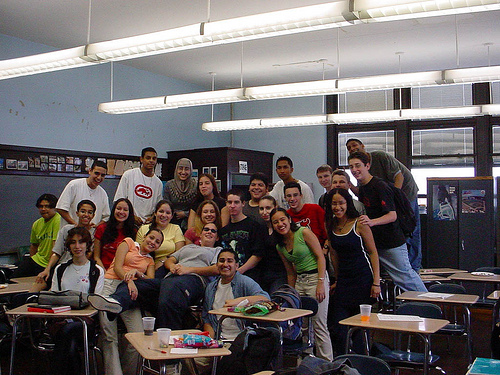If you’re a teacher, say “please” and “thank you”

*Ray Salazar tells us there’s a new no-nonsense trend in education. It requires teachers to be direct and to focus on instruction – “don’t say please and thankyou.” Ray takes exception to that and tells us how his years of experience in the classroom have tought him that basic respect is essential. VL
 By Ray Salazar, The White Rhino
By Ray Salazar, The White Rhino
In all the years I’ve taught in the Chicago Public Schools, I cannot recall a time when the art of teaching—the art of good teaching—has been strategically watered down to one thing: compliance. A recent NPR story covered a “No-Nonsense” approach to teaching where teachers do not say “please” or “thank you.” Directions are bluntly given and interactions remain brusque because the focus, they say, is on instruction.
“Your pencil is in your hand. Your voice is on zero. If you got the problem correct, you’re following along and checking off the answer. If you got the problem incorrect, you are erasing it and correcting it on your paper.”
This is what the teacher in the NPR piece commands.
So what do students in these contexts—in some charter AND some traditional schools—learn? They learn that they don’t deserve to be spoken to with professional kindness.
A few years ago, I escaped an Academy for Urban School Leadership “teaching training” program I got grandfathered into. The guiding text for training the next generation of teachers was Teach Like a Champion. Our coach told us not to say “please” or “thank you” to students. We were supposed to be no nonsense.
That didn’t sit well with me. I left that nonsense after a semester.
Listen to anyone teaching with this no-nonsense style and their tone is cold, distant, mechanical. This approach ignores everything that intellectual and personal development is based on—professional relationships.
This no-nonsense approach reminds me of many bosses at my first job. At fifteen, I started working at Burger King. Many of those managers carried a persona of superiority and distance. “Drop another basket of fries!” I’d hear on Friday nights. “Punch out when you finish sweeping.” I hated that tone. They spoke to us as if they hated being there.
When I became assistant manager at sixteen, I fell into some of this, too. That was the training model I saw. I hated the way I felt after a shift: tense, angry, bitter because of my impatience.
There was one boss, however, Diane, who managed differently. She always kept her cool when we got hit with long lines. She pushed and pushed us to follow rules even under pressure: “Use the ice scooper when filling cups.”
“It’s quicker to stick the cup in the ice container,” I’d snap back.
I learned the word “obstinate” from her. She wanted quality over quantity. Even though orders took longer to get out sometimes on her shift, because of her demeanor, I liked working with her. Her shifts were never tense.
This is why we need to fight against these no-nonsense teaching approaches. These military-like commands don’t build meaningful relationships between teachers and students. They prevent them.
We don’t lose anything as teachers by saying “thank you” when a student hands us an assignment (even if it’s late). We don’t abandon our position of power when we say, “Please make sure your dialogue is punctuated according to the guidelines.” Instead, we teach our students that no matter how smart we are, we need people skills—social skills—to succeed.
I’m not saying we allow for casual class environments where students work only if they feel like it or allow them to space out while we give directions. My students know . . .
READ MORE HERE
This article was originally published in The White Rhino.
[Photo by Jenn Vargas/Flickr]

